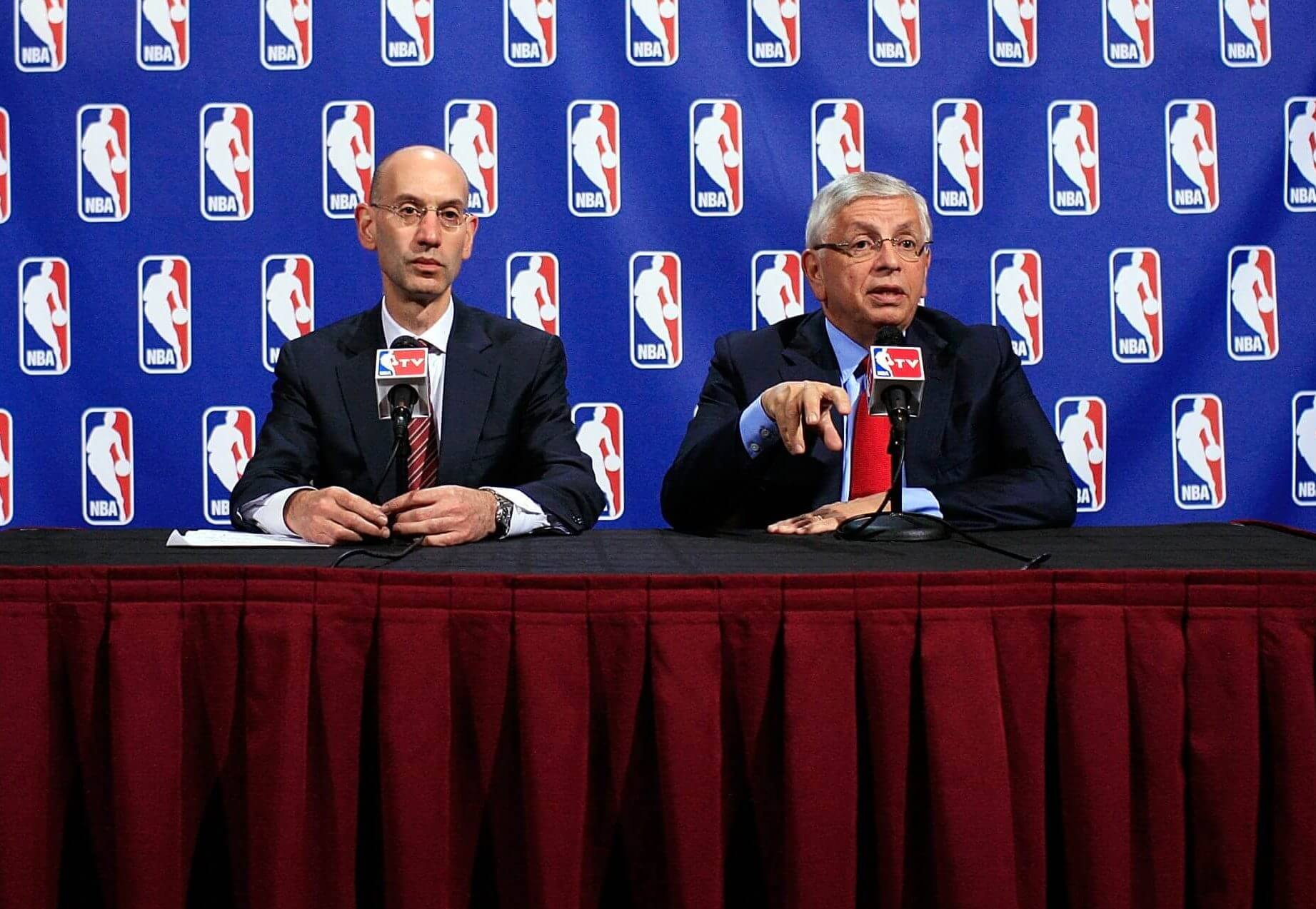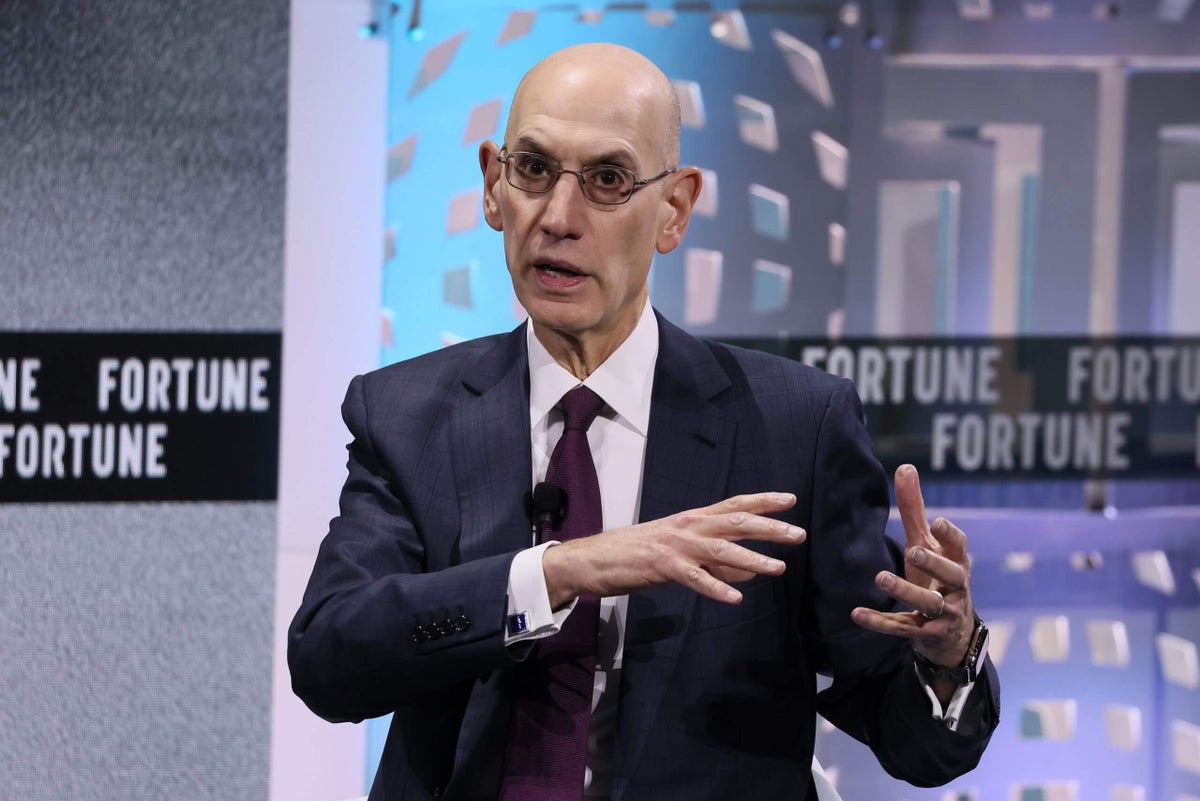NEW YORK — The NBA is in a mess it could have, should have, and perhaps at one time did see coming concerning sports betting.
David Stern was still commissioner in 2012 when he gave a deposition in the landmark New Jersey case that eventually led to the legalization of sports betting in a majority of states, and he argued it “threatens to harm irreparably not only the unique relations the NBA enjoys with its existing fans, but also the league’s potential relationship with future fans.”
Thirteen years later, following sports betting’s legalization in 38 states and four arrests of current or former NBA players for participation in illegal betting, Stern’s testimony sounds prescient. But his statements also mark the last time a prominent league official spoke out against sports betting. In fact, Stern’s successor, Adam Silver, was the first pro sports commissioner to come out in favor of it.
On the heels of Thursday’s stunning indictments, in which Miami Heat guard Terry Rozier, Portland Trail Blazers coach and hall-of-fame player Chauncey Billups, and former NBA player and coach Damon Jones were charged with participation in illegal betting schemes, The Athletic compiled a timeline highlighting key moments in the NBA’s attitude toward, and relationship with, legalized sports betting.
Dec. 7, 2012: Stern’s stern words
The NBA, Major League Baseball, the National Football League and the NCAA sued the state of New Jersey over a law passed and signed by then-Gov. Chris Christie that legalized sports betting in the state and defied a federal ban.
In Stern’s deposition, published on the date listed above, he said, “The one thing I’m certain of is New Jersey has no idea what it’s doing and doesn’t care because all it’s interested in is making a buck or two, and they don’t care that it’s at our potential loss.”
Nov. 13, 2014: Silver’s new song
Silver, the newly minted commissioner and Stern’s successor, wrote an op-ed for The New York Times in which he called for a federal law legalizing sports betting.
“Betting on professional sports is currently illegal in most of the United States outside of Nevada. I believe we need a different approach,” Silver’s article began.
Silver, who officially succeeded Stern on Feb. 1, 2014, argued that public attitudes toward betting were changing and developed countries with professional sports in Europe allowed sports betting. He wrote:
“Congress should adopt a federal framework that allows states to authorize betting on professional sports, subject to strict regulatory requirements and technological safeguards.
These requirements would include: mandatory monitoring and reporting of unusual betting-line movements; a licensing protocol to ensure betting operators are legitimate; minimum-age verification measures; geo-blocking technology to ensure betting is available only where it is legal; mechanisms to identify and exclude people with gambling problems; and education about responsible gaming.”
October 2015: Stern’s about-face
Stern, speaking at a New York forum on the future of sports media, said: “I’m with commissioner Silver. There should be a federal legislation that says, ‘Let’s go all the way,’ and have betting on sports. It’s OK. It’s going to be properly regulated.”
Stern again spoke in support of legalized sports betting the following year at a conference in Las Vegas.

David Stern, right, sits next to Adam Silver, his eventual successor as NBA commissioner, during a joint news conference in 2011. (Patrick McDermott / Getty Images)
May 14, 2018: Supreme Court strikes down federal ban
In a 6-3 decision, the court ruled sports betting was a state issue, striking down the federal ban and opening the floodgates for the widespread legalization we see today.
The NBA, and several other major pro sports leagues, had already swung into action. They’d launched what became a state-by-state campaign to change laws so that the leagues would be required to receive a cut of the proceeds from bets on their sport. Millions were spent on lobbyists to strong-arm lawmakers in Congress and at statehouses across the country.
The campaign ultimately didn’t work, but the leagues found better, more effective ways to make money. First, they sold their statistics, or “official league data,” to betting companies. Then…
July 31, 2018: NBA, MGM strike a deal
The NBA announced that MGM Resorts International would be the league’s official gambling partner, the first partnership of its kind with a major sports league in the United States. Similar deals eventually followed between the NBA and other betting companies, including DraftKings and FanDuel. As part of the NBA’s original deal with MGM, the casino conglomerate would use official NBA data on its betting platform and work with the league to detect and prevent fraud and game-fixing. MGM also had the right to use NBA and WNBA marks and team logos, worked on a coordinated marketing plan with the league. Deals like this also included payments to the leagues off money taken in on bets.
Individual sports teams in the pro leagues, including the NBA, cut similar individual deals with sports books.
March 20, 2024: Gamblers bother players, coaches
Then-Cavaliers coach J.B. Bickerstaff raised eyebrows before a game when he said, “I personally have had my own instances with some of the sports gamblers, where they got my telephone number, were sending me crazy messages about where I live, and my kids and all that stuff.”
Around that time, similar statements were made by Indiana Pacers star Tyrese Haliburton and Miami Heat coach Erik Spoelstra.
March 25, 2024: Porter scandal erupts
ESPN reports that Toronto Raptors player Jontay Porter is under federal investigation for his role in numerous betting irregularities surrounding games in 2024 in which Porter, or his team, had played. An NBA spokesman said the league was “looking into it.”
Porter was under investigation for betting on NBA games, including placing bets against the Raptors, and for manipulating his own performance to affect prop bets against him. The investigation was triggered by the league’s betting partners flagging the suspicious bets.
Porter was on a “two-way” contract with the Raptors, which means he played part of the time in the G League, the NBA’s minor league.
April 17, 2024: Banned
The NBA did more than look into Porter. It found Porter privately told a sports bettor he was injured, removed himself from a game to control prop bets on his own play and placed his own wagers on NBA games.
Silver, in issuing Porter’s expulsion from American pro basketball, said Porter had committed “the cardinal sin.”
According to the results of a league investigation, Porter, 24, gave a confidential tip about his health to a person he knew to be a sports bettor before the Raptors’ game on March 20, 2024, against the Sacramento Kings. A third individual, connected to Porter and the original recipient of Porter’s health information, placed an $80,000 parlay bet to win $1.1 million, a wager that hinged on the prediction that Porter would underperform against the Kings.
To make sure the bet hit, the league found, Porter pulled himself out of that Kings game after just three minutes, claiming he was ill.
The investigation also showed that from January through March, Porter, while splitting games between Toronto and its G League affiliate, Raptors 905, placed at least 13 bets on NBA games using an associate’s online betting account. Although none of those bets were on games in which Porter played, he did bet on the Raptors to lose as part of a parlay bet. The wagers ranged in size from $15 to $22,000, and totaled $54,000. He netted nearly $22,000 in winnings on the bets, the league said.
“There is nothing more important than protecting the integrity of NBA competition for our fans, our teams and everyone associated with our sport, which is why Jontay Porter’s blatant violations of our gaming rules are being met with the most severe punishment,” Silver said in a statement announcing Porter’s expulsion.
Porter was charged federally with conspiracy to commit wire fraud in connection with a sports betting scheme on July 10, 2024.
Oct. 18, 2024: The Porter rule
Per an agreement between the NBA and its betting partners, including FanDuel, DraftKings and BetMGM, no “under” bets would be offered on any player on either a two-way or 10-day contract.
But federal probes were about to expand way past pro basketball minor leaguers.
Jan. 30, 2025: Rozier allegations surface
The Wall Street Journal reports Rozier is under federal investigation for possibly manipulating his performance in a 2023 NBA game as part of an illegal sports gambling operation. The NBA confirmed the ongoing investigation, but said it conducted its own examination of the allegations and “did not find a violation” of league rules.
The game and performance under scrutiny took place March 23, 2023, when Rozier was still with the Charlotte Hornets. Rozier played just nine minutes and 34 seconds in a game against the New Orleans Pelicans and scored five points.
Before the game against the Pelicans, Rozier averaged 35.3 minutes and 21.1 points per contest that season. He had just started a four-year, $96.23 million contract.
June 29, 2025: Beasley’s turn
Reports surface that Malik Beasley, then of the Detroit Pistons, was under federal investigation. Beasley’s attorney said the U.S. Eastern District informed them later last summer he was no longer a target of the investigation, but the NBA said it had launched its own investigation.
The Pistons pulled a three-year, $42 million contract offer to Beasley off the table at the start of free agency because of the investigations, and he remains unsigned.
Oct. 22, 2025: The betting probe expands
Rozier, basketball Hall of Famer Chauncey Billups and Damon Jones, a former player and confidant to LeBron James, are charged with federal crimes related to separate illegal betting schemes.
Rozier was charged with the exact allegation the NBA had found “no wrongdoing” on earlier this year, which was explained in background conversations as the league not having the resources or subpoena power of the federal government.
“We are in the process of reviewing the federal indictments announced today,” the NBA said in a statement. “Terry Rozier and Chauncey Billups are being placed on immediate leave from their teams, and we will continue to cooperate with the relevant authorities. We take these allegations with the utmost seriousness, and the integrity of our game remains our top priority.”
The Athletic has live coverage of the U.S. federal betting investigation into NBA players.
